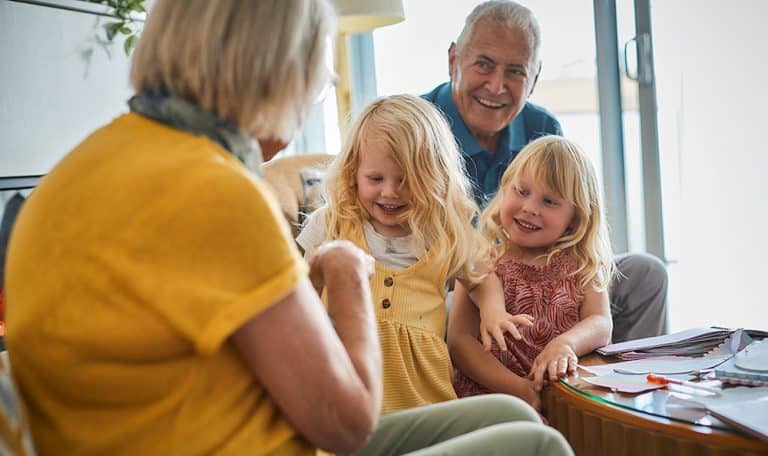How to support a loved one living with Dementia
“As we become more emotional & less cognitive, it’s the way you talk to us, not what you say, that we will remember. We know the feelings, but don’t know the plot. Your smile, your laugh & your touch are what we connect with.“
~ Christine Bryden
With close to half a million Australians affected, many of us know someone living with Dementia. However, understanding what that actually means for those affected and how we can support them to lead their best life is another story.
At The Richardson an often-used phrase to elucidate Dementia is, ‘If you’ve met one person living with Dementia, you’ve met one person living with Dementia’. Dementia is a different experience for every individual and this can make supporting a loved one living with dementia difficult and sometimes overwhelming.
To help you navigate this world, Dementia Australia have honed in on seven areas that you can fine-tune to support a loved one living with Dementia; we thought we best share them all.
Home Life
People living with dementia can experience their world as confusing, disorienting and, at worst, disabling and even dangerous. A well-lit home, devoid of trip hazards, with familiar keepsakes and frequently used items kept in plain sight, can help maintain abilities and create meaningful engagement. Providing essential prompts, accessibility and reducing risks can support a person living with dementia.
At The Richardson, we have a memory support community in which their communal dining and lounge space has been adapted to have a positive effect on a person living with dementia. This includes such elements as a date, day and weather board, glass door grazing fridge (from which they can choose snacks throughout the day) distinct artwork so that they may orientate themselves easily and different textures and colours (e.g. cushions and tactile objects) to provide sensory engagement. This help sheet has simple ideas for creating a dementia friendly environment in your home or visit the Dementia Enabling Environments website for practical tips, guides and resources to make the place where we live more Dementia enabling.
Space
This refers to the concept that, due to our lack of understanding of our loved ones capabilities, we may find ourselves taking over and not allowing them the space to do things for themselves. Dementia presents differently in each individual and it is important that we slow down and allow our loved ones the opportunity to communicate. What’s more, when we are communicating with someone affected by Dementia we must make sure we speak to them and not their carer, or their family member or friend.
This leaflet is a handy reference for the principles of communication with those living with Dementia.
Listen
We can tend to go into problem solving mode when we believe someone close to us needs help. But, more often than not, they are not wanting a solution, they are just looking for a familiar face and listening ear. No doubt learning to live with Dementia is extremely challenging for both those affected and their loved ones.
Sometimes hearing the experience of others can help contextualise one’s own experience; here are a few recommended reads:
1. ‘Somebody I Used to Know‘ by Wendy Mitchell
2. ‘What the hell happened to my brain? Living beyond Dementia‘ by Kate Swaffer
3. ‘Dear Alzheimer’s, A Diary of Living with Dementia‘ by Keith Oliver
4. ‘Dancing with Dementia’ by Christine Bryden
Words
At The Richardson we regularly talk about the importance of words. We know only too well that the words used in speech and in writing can influence a persons mood, self-esteem, and feelings of well-being.
A casual misuse of words or the use of words with negative connotations when talking in everyday conversations can have a profound impact on a person. Furthermore, not giving a person the opportunity to find their own words can be very frustrating for them and prevent them from participating in the conversation.
Stop, slow down and take the time to find the right words and enable others to find their words too.
Remind Me
A person living with dementia may be more able to effectively manage their symptoms through the use of technology, aids and reminders. At The Richardson we have introduced Tech Hour, an opportunity for our residents to learn how to optimise their personal tech (mobile phones, tablets and computers), led by John from our Lifestyle team. Similarly, if you can find time to trouble shoot technology issues on a weekly basis it will likely have a positive effect on your loved one’s quality of life.
There are also a number of apps you can download to support people living with Dementia; for example A Better Visit is a free app featuring a range of two-player games designed to enhance communication and facilitate positive social interactions between people living with dementia and their visitors.
Initiative
If your loved-one living with Dementia wants to make plans, then the best thing to do is help them! Other family and friends may want to spend time with your loved one, but are unsure how to stay connected in ways that are meaningful. You can help them by assuring them of how much they matter and the important role they play in ensuring your loved one is living their best life.
This booklet, Family and Friends Matter includes real life stories of friends and families learning to reconnect with their loved one who is living with Dementia and shares tips of how to make time together enjoyable for all involved.
Health
This comes up in almost all of our topics and today is no exception. Activities for the brain and body along with eating well and drinking plenty of water are proven to improve the wellbeing of those with Dementia. At The Richardson we have a dynamic lifestyle program including a range of brain training and exercise sessions to ensure all our residents are living their best life.
With the introduction of Vitality+, our new Allied Health service that is based onsite, we now have a wellness package tailored to each residents specific needs. But, for those at home or visiting a loved one, simply going for a walk can significantly improve their day, and yours.
If you wish to speak to someone about your situation or that of a loved one, or would like to book a tour through The Richardson, please don’t hesitate to contact us on (08) 9381 2800 or book a tour online.


